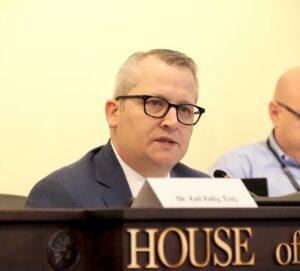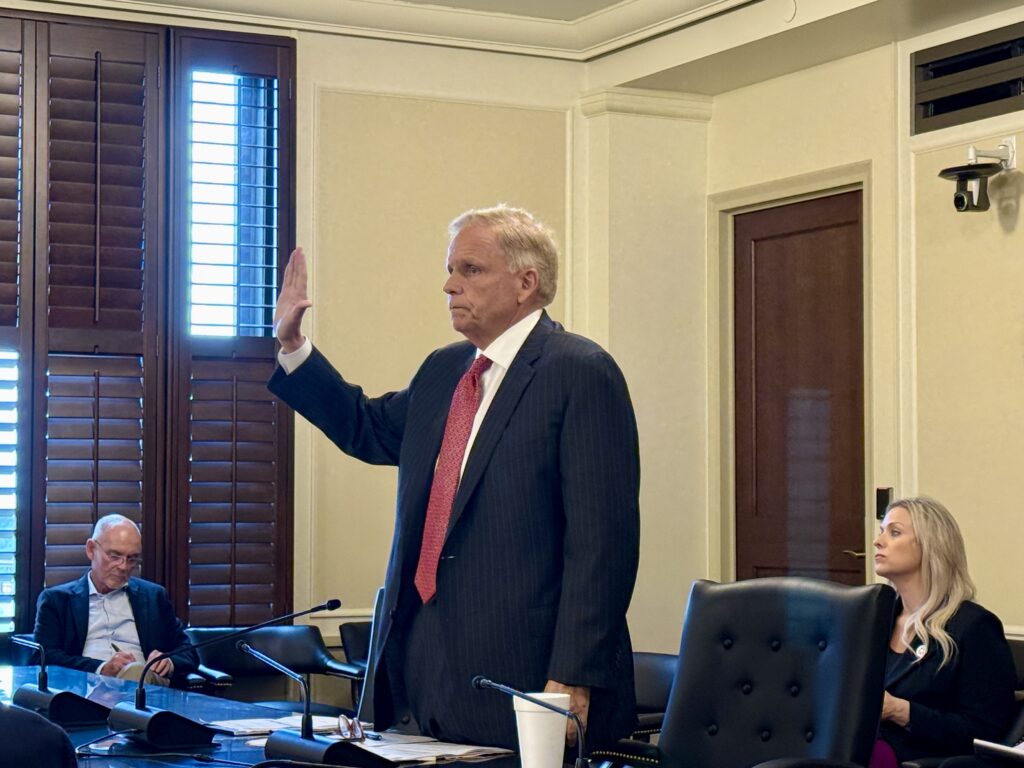Skip Leonard, interim chief financial officer for the Oklahoma mental health department, takes an oath to give a special House committee testimony on the agency’s financial shortfalls Thursday at the state Capitol. (Photo by Emma Murphy/Oklahoma Voice)
OKLAHOMA CITY — House lawmakers questioned the qualifications of the mental health department’s chief financial officer after he was unable to provide basic information about the agency’s budget shortfall and why it cannot pay its bills.
Lawmakers spent three hours peppering Skip Leonard with questions about the Oklahoma Department of Mental Health and Substance Abuse Services’ $43 million deficit, what steps they’ve taken to fill the gap, and how a $6.2 million supplemental request would be enough to carry the agency through the end of the fiscal year.
Leonard, the agency’s interim chief financial officer tasked with managing the agency’s over $610 million budget, was unable to give specific examples to many questions, but promised a renewed budget request of the Legislature by next week.
Leonard’s testimony, which was made under oath, filled the second day of a special House committee hearing investigating the agency’s finances. Lawmakers are probing reports of financial disarray at the agency as well as why some provider contracts were abruptly cut or canceled. Allie Friesen, the mental health commissioner, who testified last week has pointed fingers at previous administrations for financial problems and a failure to make proper budget requests.
Oklahoma Department of Mental Health and Substance Abuse Services Commissioner Allie Friesen, right, and the agency’s general counsel, Christina Green, left, attend a meeting April 17. (Photo by Emma Murphy/Oklahoma Voice)
During her testimony, Friesen told lawmakers to ask Leonard for specifics about the agency’s financial shortfalls.
Frustration visibly built among lawmakers throughout the meeting as Leonard and the agency’s general counsel, Christina Green, were unable to explain the numbers being presented.
Rep. T.J. Marti, R-Broken Arrow, asked Leonard about his qualifications to be the chief financial officer of a state agency.
Leonard said he was formerly a city manager who has dealt with large budgets, but is not a certified public accountant and has no experience leading finances for a state agency.
“I’m guessing I’m not the only one in here at this point that’s mildly confused at the CFO of the agency not being able to be the one that can do a deep dive into issues,” Marti said. “I’m appreciating what you’re bringing to the table … but if the chief financial officer of the (agency) is more of a visionary on community outreach and not diving deep into these issues, I find that concerning.”
Leonard said he was not initially hired to be a CFO. Leonard’s LinkedIn profile lists his initial role with the agency as “executive partnership consultant,” which he began in November. He said he received “no formal training” from the agency when he became interim CFO.
He said he first became aware of the deficit around 4 p.m. Feb. 21 after an agency budget director brought it to his attention. At first, agency officials believed the deficit was $63.7 million, but after further investigation, they later lowered the shortfall to $43 million. Leonard also said the agency spent $9.5 million from its budget for the current fiscal year on last year’s debts.
Marti said Leonard’s hourly pay rate adds up to $343,000 if he were to be employed full time for a year at his current hourly rate of $165 per hour. No listing has been posted for a permanent CFO yet, as Leonard said they’re waiting until the agency “gets through” its current budget situation.
Marti said in the last year, the agency hired 20 employees with salaries $100,000 or more. He said 12 more had their salaries raised to that level, and another 13 were hired with salaries under six figures.
Rep. Ellyn Hefner, D-Oklahoma City, also questioned Leonard’s apparent lack of understanding on specifics of the agency’s finances.
“Respectfully, Mr. Leonard, do you recognize your lack of knowledge and skill?” she said. “Why would you stay in this position, with all these months going by, making critical decisions that have definitely hit providers in our districts?”
After the hearing, Rep. Mark Lawson, R-Sapulpa, who chaired the special committee, said he still has a lot of questions, and it’s concerning that there isn’t more clarity and certainty in the two months since the department leaders were made aware of the deficit.
“We started all of this to have more confidence in the numbers that have been presented,” he said. “I don’t know that I have any more confidence today than the day when we started. But we’re committed to getting this information so that we can make the best decisions that we can before sine die.”
He said he’s not sure why the agency only needs a $6.2 million supplemental.

Rep Mark Lawson, R-Sapulpa, leads an April 17 meeting of a special House committee reviewing finances of the Oklahoma mental health department. (Photo by Emma Murphy/Oklahoma Voice)
House Speaker Kyle Hilbert, R-Bristow, also said during the hearing that he doesn’t understand how the supplemental budget request could cover such a large deficit.
“Essentially, the department had a $9.5 million structural deficit from the jump,” he said. “And you’re short and you’re only asking for $6.2 million. I would say, publicly, that’s great if all we need is $6.2 million, but Mr. Leonard, the math is just not adding up.”
Leonard, who said he assumed the interim role in January, said he “can’t answer all those questions completely,” but told lawmakers $2.9 million in contracts were cut, the agency found $8 million in “fixed utilization savings,” and another $3.5 million to $4 million in contract cuts within the department.
Lawmakers also asked the mental health department’s general counsel, Green, questions focused on nondisclosure and confidentiality agreements signed by executive staff within the agency.
Green said state law doesn’t allow or preclude state agencies from having employees sign such agreements and said they were requested by Friesen to prevent information from being leaked from executive staff meetings on sensitive internal investigations.
Green said she drafted an initial NDA from an existing agency draft, but later found it was too restrictive as it would allow the agency to pursue monetary damages against employees. She then created a second, briefer confidentiality agreement.
Leonard and Green said signing the agreements was optional. Leonard and Green both signed such agreements.
Rep. Chris Kannady, R-Oklahoma City, said there was “indication” that the agency’s director of workplace violence and behavioral threat assessment had held a meeting with those asked to sign the agreements, threatening to go “full cop mode” if they weren’t signed.
Green and Leonard both said they were not present at the meeting, didn’t know who attended, or what was discussed.
House officials hope to hold additional hearings next week, including one with Regina Birchum, executive director of the Legislative Office of Fiscal Transparency. LOFT is also investigating the mental health department’s finances in addition to the committee, the state auditor and a “special investigator.”
SUBSCRIBE: GET THE MORNING HEADLINES DELIVERED TO YOUR INBOX
SUPPORT: YOU MAKE OUR WORK POSSIBLE
Read the full article here


